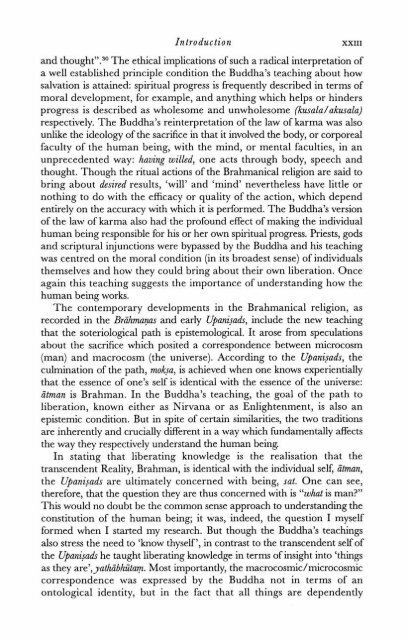Identity and Experience_Hamilton_1996
Identity and Experience_Hamilton_1996
Identity and Experience_Hamilton_1996
Create successful ePaper yourself
Turn your PDF publications into a flip-book with our unique Google optimized e-Paper software.
Introduction<br />
XXIII<br />
<strong>and</strong> th~ught".~' The ethical implications of such a radical interpretation of<br />
a well established principle condition the Buddha's teaching about how<br />
salvation is attained: spiritual progress is frequently described in terms of<br />
moral development, for example, <strong>and</strong> anything which helps or hinders<br />
progress is described as wholesome <strong>and</strong> unwholesome (kusala/akusala)<br />
respectively. The Buddha's reinterpretation of the law of karma was also<br />
unlike the ideology of the sacrifice in that it involved the body, or corporeal<br />
faculty of the human being, with the mind, or mental faculties, in an<br />
unprecedented way: having willed, one acts through body, speech <strong>and</strong><br />
thought. Though the ritual actions of the Brahmanical religion are said to<br />
bring about desired results, 'will' <strong>and</strong> 'mind' nevertheless have little or<br />
nothing to do with the efficacy or quality of the action, which depend<br />
entirely on the accuracy with which it is performed. The Buddha's version<br />
of the law of karma also had the profound effect of making the individual<br />
human being responsible for his or her own spiritual progress. Priests, gods<br />
<strong>and</strong> scriptural injunctions were bypassed by the Buddha <strong>and</strong> his teaching<br />
was centred on the moral condition (in its broadest sense) of individuals<br />
themselves <strong>and</strong> how they could bring about their own liberation. Once<br />
again this teaching suggests the importance of underst<strong>and</strong>ing how the<br />
human being works.<br />
The contemporary developments in the Brahmanical religion, as<br />
recorded in the Brihmaes <strong>and</strong> early Upanisads, include the new teaching<br />
that the soteriological path is epistemological. It arose from speculations<br />
about the sacrifice which posited a correspondence between microcosm<br />
(man) <strong>and</strong> macrocosm (the universe). According to the Upani~ads, the<br />
culmination of the path, mok,ra, is achieved when one knows experientially<br />
that the essence of one's self is identical with the essence of the universe:<br />
itman is Brahman. In the Buddha's teaching, the goal of the path to<br />
liberation, known either as Nirvana or as Enlightenment, is also an<br />
epistemic condition. But in spite of certain similarities, the two traditions<br />
are inherently <strong>and</strong> crucially different in a way which fundamentally affects<br />
the way they respectively underst<strong>and</strong> the human being.<br />
In stating that liberating knowledge is the realisation that the<br />
transcendent Reality, Brahman, is identical with the individual self, itman,<br />
the Upanisads are ultimately concerned with being, sat. One can see,<br />
therefore, that the question they are thus concerned with is "what is man?"<br />
This would no doubt be the common sense approach to underst<strong>and</strong>ing the<br />
constitution of the human being; it was, indeed, the question I myself<br />
formed when I started my research. But though the Buddha's teachings<br />
also stress the need to 'know thyself ', in contrast to the transcendent self of<br />
the Upanisads he taught liberating knowledge in terms of insight into 'things<br />
as they are', yathibhiitdm. Most importantly, the macrocosmic/microcosmic<br />
correspondence was expressed by the Buddha not in terms of an<br />
ontological identity, but in the fact that all things are dependently


